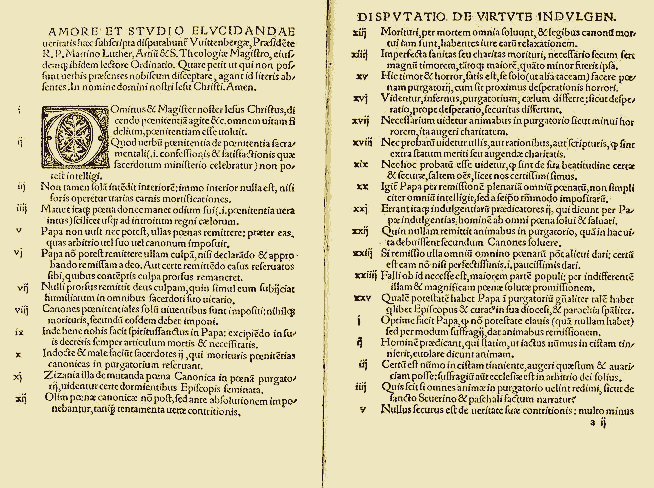Hello ladies and gents this is the Viking telling you that today we are talking about
THE REFORMATION
The Reformation (alternatively named the Protestant Reformation or the European Reformation) was a major movement within Western Christianity in 16th-century Europe that posed a religious and political challenge to the Catholic Church and in particular to papal authority, arising from what was perceived to be errors, abuses, and discrepancies by the Catholic Church. The Reformation was the start of Protestantism and the split of Protestantism from the Roman Catholic Church.
Although the Reformation is usually considered to have started with the publication of the Ninety-five Theses by Martin Luther in 1517, there was no schism between the Catholic Church and the nascent Luther until the 1521 Edict of Worms. The edict condemned Luther and officially banned citizens of the Holy Roman Empire from defending or propagating his ideas.
The end of the Reformation era is disputed: it could be considered to end with the enactment of the confessions of faith. Other suggested ending years relate to the Counter-Reformation or the Peace of Westphalia. From a Catholic perspective, the Second Vatican Council called for an end to the Counter-Reformation.
Movements had been made towards a Reformation prior to Martin Luther, so some Protestants, such as Landmark Baptists, in the tradition of the Radical Reformation prefer to credit the start of the Reformation to reformers such as Arnold of Brescia, Peter Waldo, John Wycliffe, Jan Hus, Petr Chelčický, and Girolamo Savonarola. Due to the reform efforts of Hus and other Bohemian reformers, Utraquist Hussitism was acknowledged by the Council of Basel and was officially tolerated in the Crown of Bohemia, although other movements were still subject to persecution, including the Lollards in England and the Waldensians in France and Italian regions.
Luther began by criticising the sale of indulgences, insisting that the Pope had no authority over purgatory and that the Treasury of Merit had no foundation in the Bible. The Reformation developed further to include a distinction between Law and Gospel, a complete reliance on Scripture as the only source of proper doctrine (sola scriptura) and the belief that faith in Jesus is the only way to receive God's pardon for sin (sola fide) rather than good works.
Although this is generally considered a Protestant belief, a similar formulation was taught by Molinist and Jansenist Catholics. The priesthood of all believers downplayed the need for saints or priests to serve as mediators, and mandatory clerical celibacy was ended. Simul justus et peccator implied that although people could improve, no one could become good enough to earn forgiveness from God. Sacramental theology was simplified and attempts at imposing Aristotelian epistemology were resisted.
Luther and his followers did not see these theological developments as changes. The 1530 Augsburg Confession concluded that "in doctrine and ceremonies nothing has been received on our part against Scripture or the Church Catholic", and even after the Council of Trent, Martin Chemnitz published the 1565–73 Examination of the Council of Trent as an attempt to prove that Trent innovated on doctrine while the Lutherans were following in the footsteps of the Church Fathers and Apostles.
The initial movement in Germany diversified, and other reformers arose independently of Luther such as Zwingli in Zürich and John Calvin in Geneva. Depending on the country, the Reformation had varying causes and different backgrounds and also unfolded differently than in Germany. The spread of Gutenberg's printing press provided the means for the rapid dissemination of religious materials in the vernacular.
During Reformation-era confessionalization, Western Christianity adopted different confessions (Catholic, Lutheran, Reformed, Anglican, Anabaptist, Unitarian, etc.). Radical Reformers, besides forming communities outside state sanction, sometimes employed more extreme doctrinal change, such as the rejection of the tenets of the councils of Nicaea and Chalcedon with the Unitarians of Transylvania. Anabaptist movements were especially persecuted following the German Peasants' War.
Leaders within the Roman Catholic Church responded with the Counter-Reformation, initiated by the Confutatio Augustana in 1530, the Council of Trent in 1545, the Jesuits in 1540, the Defensio Tridentinæ fidei in 1578, and also a series of wars and expulsions of Protestants that continued until the 19th century. Northern Europe, with the exception of most of Ireland, came under the influence of Protestantism.
Southern Europe remained predominantly Catholic apart from the much-persecuted Waldensians. Central Europe was the site of much of the Thirty Years' War and there were continued expulsions of Protestants in Central Europe up to the 19th century. Following World War II, the removal of ethnic Germans to either East Germany or Siberia reduced Protestantism in the Warsaw Pact countries, although some remain today.
Absence of Protestants however, does not necessarily imply a failure of the Reformation. Although Protestants were excommunicated and ended up worshiping in communions separate from Catholics, contrary to the original intention of the Reformers, they were also suppressed and persecuted in most of Europe at one point.
As a result, some of them lived as crypto-Protestants, also called Nicodemites, contrary to the urging of John Calvin, who wanted them to live their faith openly. Some crypto-Protestants have been identified as late as the 19th century after immigrating to Latin America
And as always have a chilled day from the Viking

Comments
Post a Comment